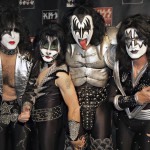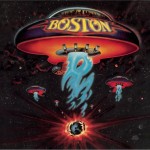 Since David Grohl was at SXSW this year, I’m reminded…
Since David Grohl was at SXSW this year, I’m reminded…
It’s really important to know your audience, know when to change and how to stay relevant. This is true for any business, and especially true for musicians. Since music is ever changing, and audiences always grow older, a band has to adapt or suffer the consequences. No one wants to become irrelevant. Who is your audience? Have they changed? Do you need to change or completely start over?
1982 Baby Boomer Anthem
If you listened to the radio in the early 80′s a certain band dominated the airwaves. Seriously dominated. You couldn’t escape their songs, with simple bass intros, synthesizers and quick catchy lyrics. Hear one of their songs once, and bam! It stuck in your head the rest of the day. The cover of the second album was plastered everywhere, so a close-up of the lead singers backside in red leather pants became their calling card–they were always in red leather. Since this was pre-Pandora and pre-Spotify and pre-CDs there was just no way you could escape Loverboy. And Baby Boomers loved their music. Their song “Working for the Weekend” became a pop anthem.
Almost ten years later the same red leathered lead singer heard a different sound coming through the airwaves. Very different. Loverboy lead singer Mike Reno recalled to Andy Greene of Rolling Stone in May 2011. “As I once said on MTV, Nirvana killed our career, you just looked at the charts, and it was all negative lyrics – and people dressed up like lumberjacks. The Seattle grunge thing just took over everything.”
1991 Good morning Gen X
Hello Nirvana. Hello grunge. Kurt Cobain became the unofficial spokesman for a whole new generation where he knew his audience very well. He wrote songs that connected with lonely souls. Nirvana sparked a groundswell of Seattle bands that rocked hard with a worn, weathered look keeping to the realities of daily life. 1986 shuttle disaster, 1987 Black Monday, 1988 fall of Berlin Wall. Upending change was the norm.
Where Mike Reno loved the stage, Cobain hated it. He resisted the celebrity that rock and roll brought and grew weary of speaking for a generation. His audience got what they wanted from his songs, but in the end, they wanted more from him than he was willing to give.
2011 Gen X meet Gen Y
So what did the “lumberjacks” end up doing?After Cobain’s death, Nirvana’s drummer David Grohl, picked himself up and started over by taking center stage and founding the Foo Fighters. Grohl’s songs tend to strike a balance between driving rock (Gen X angst), authentic lyrics (Gen Y) and makes for a good Spotify playlist (Gen Y). Right now, Grohl knows his audience better than anyone and he’s got the Grammy to prove it. What he said in his acceptance speech gives you a sense of his commitment and approach as a musician. He’s not in it for the show. “Singing into a microphone and learning to play an instrument and learning to do your craft, that’s the most important thing for people to do… It’s not about being perfect, it’s not about sounding absolutely correct, it’s not about what goes on in a computer. It’s about what goes on in here [your heart] and what goes on in here [your head].”I hope someday the lead singer from Loverboy, will meet the lead singer from Foo Fighters and learn something. Know your audience.



